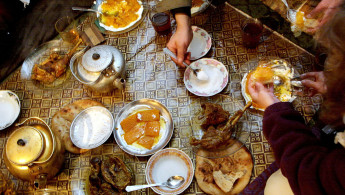A double celebration: Blending US and Afghan traditions on Thanksgiving
Zainora Babayee arrived with her family to the US from Kabul five years ago. It was September, just two months before Thanksgiving, a holiday she hadn’t heard about until then, and one she would later add to the range of holidays she now celebrates with friends and family.
“If you ask me what comes to mind when I hear Thanksgiving, it means getting together, family gatherings, and eating meals. Thanksgiving has different meanings for different communities,” Babayee, a 23 year-old University of Virginia student and oldest of seven siblings, tells The New Arab.
“For Native Americans, it’s a different meaning. For diaspora communities, it’s a different meaning. For us, since Thanksgiving is a national holiday, it’s a chance to be with family and have fun.”
"Though she and her family don’t celebrate exactly as they did back home, they put their own twist on both American and Afghan holidays"
Three years ago, as a new student in northern Virginia, she had the opportunity to spend the holiday with the Amish community in Lancaster County, Pennsylvania. There, she and other students spent three days with Amish families, seeing a rural life where people found creative ways to be self-sufficient, a way of life that few who grow up in America ever see.
“They were so warm and welcoming. They were welcoming like Afghans. I felt at home,” she says. “They loved their culture. They prayed and they welcomed us, and they said it’s time to give thanks to God and welcome new people.”
It was quite a change in scenery from the life she had made in northern Virginia, home to one of the country’s largest Afghan communities. There, she has been able to celebrate Nowruz and the two Eids with her family and friends from Afghanistan and Iran.
|
For her non-Afghan school friends in Virginia, she brings them traditional meals traditional meals on these holidays, as Muslim holidays are not officially recognised at schools in Virginia. Like many Americans, she has taken up the tradition of Friendsgiving, where she celebrates the holiday with college friends, sometimes on a different day than Thanksgiving.
Though she and her family don’t celebrate exactly as they did back home, they put their own twist on both American and Afghan holidays.
“We cook food, but not traditional food, like other Americans. We have Turkey or chicken, and we combine it with Afghan food,” she says. “The idea and purpose are similar.”
"Now in the habit of observing both Afghan and American holidays – often putting their own touch on both countries’ traditions, she says her family sometimes jokes that they’re double celebrating"
This year has been tough. She started her semester at University of Virginia, where she studies government, on 20 August, a week before the fall of Kabul.
“It was horrible,” she says. “I didn’t have time to be happy.”
She is spending this week on campus in Charlottesville, where she is celebrating Thanksgiving with friends. Right now, she’s looking forward to her next traditional family holiday, Shab-e-yalda, which commemorates the longest night of winter. She says it’s the closest thing to Thanksgiving – a time for families to gather to eat, drink, read poetry and tell stories. Seasonal foods like pomegranates and watermelons feature prominently.
Now in the habit of observing both Afghan and American holidays – often putting their own touch on both countries’ traditions, she says her family sometimes jokes that they’re “double celebrating.”
Brooke Anderson is The New Arab's correspondent in Washington D.C., covering US and international politics, business and culture
Follow her on Twitter: @Brookethenews



